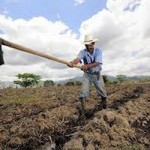
Climate change threatens our ability to feed the world.
by Lester R Brown
With falling water tables, eroding soils, and rising temperatures making it difficult to feed growing populations, control of arable land and water resources is moving to center stage in the global struggle for food security. What will the geopolitics of food look like in a new era dominated by scarcity and food nationalism? Here are a few of the many facts from the book to consider:
- There will be 219,000 people at the dinner table tonight who were not there last night — many of them with empty plates.
- As a result of chronic hunger, 48 percent of all children in India are undersized, underweight, and likely to have IQs that are on average 10-15 points lower than those of well-nourished children.
- Food prices are rising dramatically. The UN Food Price Index in June 2012 was twice the base level of 2002-04.
Lester R Brown talks about Full Planet, Empty Plates
- More than half the world’s people live in countries where water tables are falling as aquifers are being depleted.
- A startling 80 percent of oceanic fisheries are being fished at or beyond their sustainable yield.
- Between 2005 and 2011, the amount of grain used to produce fuel for cars in the United States climbed from 41 million to 127 million tons — nearly a third of the US grain harvest.
- In 2011, China consumed 70 million tons of soybeans, 56 million of which had to be imported. Almost all went into livestock feed.
- Today, with incomes rising fast in emerging economies, there are at least 3 billion people moving up the food chain, consuming more grain-intensive livestock and poultry products.
- Data for India indicate that 175 million people are being fed with grain produced by overpumping [water — emptying acquifers]. For China, there are 130 million in the same boat.
- In Ethiopia, a prime target for foreign land acquisitions yet also a major food aid recipient, an acre of land can be leased for less than $1 per year.
- The 464 land acquisitions identified by the World Bank in 2010 totaled some 140 million acres — more than is planted in corn and wheat combined in the United States.
- It’s not all bad news: 44 countries have reached population stability as a result of gradual fertility decline over the last several generations.
“In this era of tightening world food supplies, the ability to grow food is fast becoming a new form of geopolitical leverage. Food is the new oil. Land is the new gold.” – Lester R Brown
Full Planet, Empty Plates: The New Geopolitics of Food Scarcity is available for purchase online. Get a sneak peek by checking out Chapter 1: Food the Weak Link or watch the five minute video below and hear from Lester Brown himself about the main issues raised in the book.
© Copyright 2012 Lester R Brown, All rights Reserved. Written For: StraightGoods.caOne Response to “Full planet, empty plates”
Sorry, the comment form is closed at this time.


 Lester R Brown is the president of the Earth Policy Institute and author of
Lester R Brown is the president of the Earth Policy Institute and author of
In my opinion We need to replace the fossil fuel power plants, the primary source of GHG. Now! At a scale required to accomplish this task : Ethanol starves people : not a viable option. Fracking releases methane : not a viable option. Cellulose Bio Fuel Uses Food Land : not a viable option Solar uses food land : Not a viable option Wind is Intermittent : Not a viable option All Human and Agricultural Organic Waste can be converted to hydrogen, through exposure intense radiation! http://www.huffingtonpost.com/social/DennisearlBaker/2012-a-breakthrough-for-r_b_1263543_135881292.html The Radioactive Materials exist now, and the Organic waste is renewable daily. Ending the practice of dumping sewage into our water sources. Air, Water, Food and Energy issues, receive significant positive impacts . Reducing illness / health care costs as well !